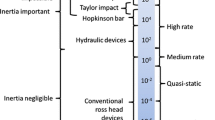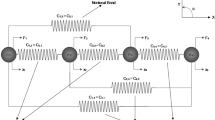Summary
This work examines critically the role that the Eshelby (energy-momentum) tensor or its degenerate form, the Mandel stress, should logically play as the driving force in an invariant formulation of the thermomechanics of finite-strain elasto-plasticity. Here the stress measure of which Mandel advocated the use in elastoplasticity, is shown to coincide, up to a sign, with the quasi-static Eshelby stress tensor expressed in the elastically released intermediate configuration. The various “constitutive” representations for the plastic rate are then discussed in terms of various thermodynamically conjugate pairs of “forces” and “velocities” for anisotropic materials.
Similar content being viewed by others
References
Epstein, M., Maugin, G. A.: The energy-momentum tensor and material uniformity in finite elasticity. Acta Mech.83, 127–133 (1990).
Epstein, M., Maugin, G. A.: On the geometrical material structure of anelasticity. Acta Mech.115, 119–131 (1996).
Maugin, G. A.: Material inhomogeneities in elasticity. London: Chapman & Hall 1993.
Maugin, G. A.: Material forces: concepts and applications. Appl. Mech. Rev.48, 213–245 (1995).
Maugin, G. A.: Eshelby stress in elastoplasticity and ductile fracture. Int. J. Plasticity10, 393–408 (1994).
Mandel, J.: Plasticité classique et viscoplasticité. CISM-Udine. Wien New York: Springer 1972.
Cleja-Tigoiu, S., Soós, E.: Elastoplastic models with relaxed configurations and internal state variables. Appl. Mech. Rev.43, 131–151 (1990).
Lubliner, J.: Plasticity theory. New York: Macmillan; Collier Macmillen Publ., London 1990.
Maugin, G. A.: The thermomechanics of plasticity and fracture. Cambridge: Cambridge Univ. Press 1992.
Lee, H., Liu, D. T.: Finite strain elastic-plastic theory. In: IUTAM Symp., Vienna 1966. Irreversible aspects of continuum mechanics and transfer of physical characteristics in moving fluids. (Parkus H., Sedov, L. I., eds.), pp. 213–222. Wien New York: Springer 1968.
Teodosiu, C., Sidoroff, F.: A finite theory of elastoplasticity of single crystals. Int. J. Engng Sci.14 713–723 (1976).
Halphen, B.: Sur le champ des vitesses en thermoplasticité finie. Int. J. Solids Struct.11, 947–960 (1975).
Halphen, B., Nguyen, Q. S.: Sur les matériaux standard généralisés. J. de Mécanique14, 39–63 (1975).
Besseling, J. F., Van der Giessen, E.: Mathematical modelling of inelastic deformation. London Glasgow New York Tokyo Melbourne Madras: Chapman & Hall 1993.
Lubliner, J.: Normality rules in large-deformation plasticity. Mech. Mat.5, 29–34 (1986).
Cleja-Tigoiu, S.: Large elasto-plastic deformations of materials with relaxed configurations — Part. I. Constitutive assumptions, Part. II. Role of the complementary plastic factor. Int. J. Engng Sci.28, 171–180 and 273–284 (1990).
Loret, B.: On the effects of plastic rotation in finite deformation of anisotropic materials. Mech. Mat.2, 287–304 (1985).
Dafalias, Y. F.: A missing link in the macroscopic constitutive formulation of large plastic deformation. In: Plasticity today (Sawczuk, A., Bianchi, G., eds.), pp. 135–150. London: Applied Science 1985.
Moran, B., Ortiz, M., Shih, F.: Formulation of implicit finite element methods for multiplicative finite deformation plasticity. Int. J. Numer. Meth. Engng29, 483–514 (1990).
Armero, F., Simo, J. C.: A priori stability estimates and unconditionally stable product formula algorithms for nonlinear coupled thermoplasticity. Int. J. Plasticity19, 749–782 (1993).
Liu, I.-S.: On representations of anisotropic invariants. Int. J. Engng Sci.40, 1099–1109 (1982).
Cleja-Tigoiu, S.: Models in multiplicative finite elasto-plasticity. (To be published).
Author information
Authors and Affiliations
Rights and permissions
About this article
Cite this article
Cleja-Tigoiu, S., Maugin, G.A. Eshelby's stress tensors in finite elastoplasticity. Acta Mechanica 139, 231–249 (2000). https://doi.org/10.1007/BF01170191
Received:
Issue Date:
DOI: https://doi.org/10.1007/BF01170191




